Hundreds protested against the US-Israel attacks on Iran in Parliament Square on Saturday, fearing a wider conflagration and horrified by the targeting of young schoolchildren, writes LINDA PENTZ GUNTER
The recent calls to strip Michelle Mone of her peerage after she was caught scamming the public for £122 million should reinvigorate the longstanding progressive demand to completely abolish the entire undemocratic, corrupt relic, writes ELLIOT TONG

 Baroness Mone ahead of the State Opening of Parliament by Queen Elizabeth II, in the House of Lords at the Palace of Westminster in London, June 21, 2017
Baroness Mone ahead of the State Opening of Parliament by Queen Elizabeth II, in the House of Lords at the Palace of Westminster in London, June 21, 2017
BRITAIN was never intended to be a democracy. Our system has been haphazardly constructed on an old, crumbling foundation, with its feudal legacy clear for all to see.
While our country’s wealthy ruling class eventually usurped the power of the monarch, the same cannot be said of regular people across the country like you and me, who have traditionally been deprived of the right to vote.
It wasn’t until relatively recently that most people, especially marginalised groups like women, have actually had a say in how our country is run. The rich haven’t been happy about this, resenting every minor concession that they have had to make, which has only ever happened when their hand has been forced by direct action against them.
While our ability to participate in the running of the country has greatly improved over the last 200 years, our country’s political leaders have made sure not to give too much power away. While this is certainly bad in the case of the House of Commons’ archaic first-past-the-post voting system, Britain’s lack of real democracy is no doubt clearest in the case of the House of Lords.
Recently, we have seen calls for Michelle Mone to lose her peerage after helping fleece the British public out of £122 million. Of course, that should happen, but this ignores the real problem: the House of Lords shouldn’t exist at all.
On October 1, PPE Medpro, a company directly linked to Baroness Mone, was asked to repay £122m that it was given by the British government to provide personal protective equipment during the Covid pandemic. Profiteering from a health crisis, PPE Medpro supplied low-quality goods to secure the largest profit that it possibly could, leaving the British public exposed.
At a fundamental level, the House of Lords is an institution that exists to promote the interests of the wealthy. The vast majority of its membership have been chosen directly by the Prime Minister, with no democratic oversight from the general public.
Of course, those that are given a peerage have usually offered the party in power some sort of favour, which regularly comes in the form of donations. With a peerage secured, a party’s wealthy benefactors can then begin to use this position for their own advantage. Often, this will dovetail with the interests of their rich colleagues.
Earlier this year, the Guardian reported that more than one in 10 peers have taken payments from big business, which undoubtedly came with strings attached.
When a new peer is added to the House of Lords, it can be nearly impossible to have them removed. We have consistently seen those rejected by the electorate, such as ex-MPs like Thangam Debbonaire, given a peerage for their service.
This allows them to run roughshod over the interests of their constituents comfortably — after all, they no longer feel the need to be accountable to the public when they become a member of the House of Lords.
In the past, many politicians and activists across the country have called for power to be placed back into the hands of regular people, but the wealthiest members of our society have worked to push anti-immigration talking points to the forefront of the public conversation in order to drown them out. After all, democratic reform would rock the boat, and the status quo suits the wealthiest just fine.
Keir Hardie, a founder of the Labour Party, called for the abolition of the House of Lords; however, this policy has fallen by the wayside now that the party has been bought out by corporate interests.
Of course, not every individual who sits within the House of Lords is a bad person. The Green Party itself has two fantastic, hardworking peers, Baronesses Natalie Bennett and Jenny Jones, who do fantastic work pushing for more democratic accountability. As a party, we have designed an internal voting system to allow peers to be selected by party members, which means everybody gets a say in who should represent us in the House of Lords.
The Green peers have consistently backed abolishing themselves and scrapping the House of Lords. However, in the meantime, it would be silly not to use a system where our peers can at least scrutinise government legislation, make the case for a fairer, greener country and try and secure positive changes to policy.
Mone is not in any way special — the only difference between her and other peers is that she got caught in the act. Removing Mone from the House of Lords would not be enough, a fact that we can’t let ourselves be distracted from. We must demand better, calling for a full abolition of this corrupt second chamber, placing power back into the hands of regular people across the country.










